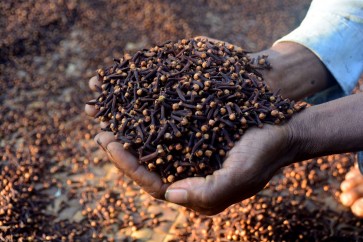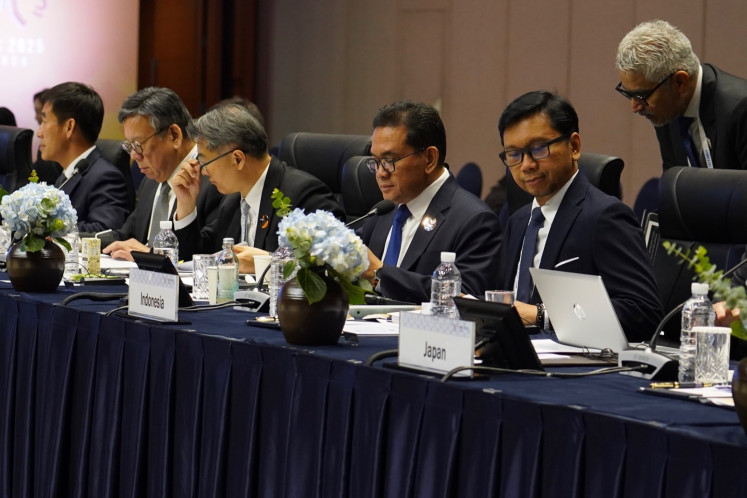Popular Reads
Top Results
Can't find what you're looking for?
View all search resultsPopular Reads
Top Results
Can't find what you're looking for?
View all search resultsNuansa 2011: Indonesian students in Singapore retrace Old Batavia legend
Ten long months of preparation paid off as the audience broke into thunderous applause, filling the theater at the Anglo Chinese Junior College
Change text size
Gift Premium Articles
to Anyone
T
en long months of preparation paid off as the audience broke into thunderous applause, filling the theater at the Anglo Chinese Junior College.
This was the curtain call of NUANSA 2011, Ca Bau Kan, The Musical, which took place on Oct. 22. With back-to-back performances, the musical was attended by a total of 894 audiences. Tickets for the evening show had been sold out for more than a month in advance.
Almost a hundred students from the Indonesian Students’ Association (PINUS) were involved in all aspects of the production. The musical, produced by Adinda Mutiara Sabila, a 3rd year Real Estate student at the National University of Singapore (NUS), was among the biggest organized by the Indonesian community in Singapore.
Based on Remy Sylado’s renowned novel of the same title, the musical breathed new life into the epic tale of love between Tinung (a ca bau kan, or native concubine) and Tan Pen Liang (a wealthy Chinese merchant from Semarang) through a magnificent blend of song and dance. A total of 14 original songs and eight dance pieces (including three traditional dances) created an enthralling audio-visual spectacle without compromising the acting or without losing the grip of the storyline. Combined with sets and props designed by Erik Kristanto Wibowo, all of these elements successfully transported the audience back in time to old Batavia in the 1940s.
The audience was immediately immersed in Giok Lan’s (Angelina Chandra) narration, as she retraced her mother’s past. Giok Lan’s mother, Tinung (Vanessa Octavia), had been forced to become a ca bau kan in Kalijodo, where she eventually met the love of her life, Tan Pen Liang (Andika Kristi). Alas, happiness does not last long as Tan Peng Liang’s own dirty tricks triggered the rage of Thio Boen Hiap (Abram Komara) from the local leading Kong Koan Party. The turmoil between the two ultimately resulted in their deaths.
Ca Bau Kan, The Musical is more than a love story. As events unfold, the boundaries between right and wrong become blurred. The two scriptwriters, Valentino Yonathan Febianto and Rahardhi Ulinnuha Pradhana did a good job with leaving the audience pondering on the meaning of justice, or whether such a thing exists at all. It became ironic that of all the characters in the musical, it is Tinung, the shunned concubine, who showed the greatest wisdom and understanding regarding the subjectivity of justice and all its consequences.
Producer and choreographer Adinda Mutiara Sabila envisioned this production as a platform for the Indonesian students of NUS to discover their talents and ignite their passion for Indonesia’s rich culture.
“With the success of this event, the team hopes to inspire the audience. With discipline, hard work and faith, everything is within reach. Our experience has proved it,” she added.
“Directing a grand musical is definitely a challenge: putting together the acting, the music, the dance and the overall production design into one unified artistic vision. However, it was a rewarding experience as the audience really enjoyed the show,” said debut director Ivan Surya Tjahyo of his experience in directing the musical.
The cast, directed by Ivan, put on a magnificent performance, giving life to each of the characters played, whether they were the main characters or supporting roles. For most, Ca Bau Kan, The Musical had been their first acting experience. And though some even had to take on double roles, they managed to display great showmanship in depicting different characters.
Abram Komara, who played the role of villain Thio Boen Hiap, spoke fondly of his involvement in the musical. “Joining this musical as a cast member has a pride of its own for me. As a performer, the opportunity to learn and work together with great talent, such as the director, choreographers and composers, is such an invaluable experience.”
Many praised the musical’s score, composed and arranged by Christine Liwang and Bagus Wicaksono, for creating the right atmosphere in the different scenes while maintaining an ”Indonesian feel”.
“We wanted to infuse more traditional elements in this performance, so we explored the use of instruments for songs that were originally meant for a gamelan ensemble,” explained Adinda. “Being students, we couldn’t afford a real gamelan set, so we encouraged the musicians to be more creative in arranging the music.”
The result was an astonishing fusion of different genres of music from jazz to traditional, delivered live by an ensemble of 12 musicians, with instruments ranging from saxophones to gendang, a traditional Indonesian drum.
“Great show! Kudos especially goes to the songwriters and musicians! Congrats!” wrote Willis Turner Henry, a student at Nanyang Technological University, on the wall of the musical’s official Facebook page a day after the performance.
The show received encouraging feedback from the audience, which comprised both the local and the Indonesian community in Singapore. Although there were some comments regarding minor technical glitches during the matinee show, this issue was resolved promptly. The evening show ran smoothly without any technical difficulties.
In her review of the musical, Theresia Sembiring, editor-in-chief of the Indonesian Professionals’ Association’s online citizen journalism platform, IPA Voices, praised the musical crew for their hard work and effort. “PINUS has indeed placed itself among the strongest and most respectable supporters of Indonesian arts and culture in Singapore,” she wrote.
A few notable guests included Mrs. Lim Phuay Choo, Senior Manager of NUS International Students’ Services and Dr. Gary Miller, President and Executive Vice Chancellor of Universitas Pelita Harapan in Indonesia.
NUANSA, short for ‘NUS and Indonesia’, is an annual production staged by members of the NUS Indonesian Students’ Association. Past productions include Prambanan (2008), Sitti Nurbaya (2009), and This Earth of Mankind (2010).










